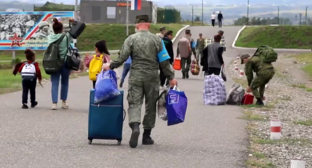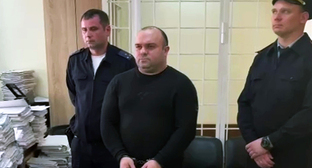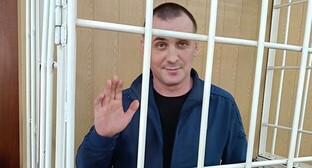
25 September 2023, 23:12
Week in the Caucasus: review of main events of September 18-24, 2023
One-day war in Nagorno-Karabakh, death of Russian peacekeepers, persecution of pacifists and activists in Southern Russia, elections and unrest in Yerevan, Kadyrov’s health state and school textbooks, and official data on the natives of Southern Russia who perished in Ukraine, – see the review of these and other events in the Caucasus during the week of September 18-24, 2023, prepared by the “Caucasian Knot”.
One-day war in Nagorno-Karabakh
On September 19, the Ministry of Defence (MoD) of Azerbaijan announced that counter-terrorism measures had been launched in Nagorno-Karabakh, aimed to ensure the provisions of the tripartite declaration, suppression of provocations, disarmament and withdrawal of the armed forces of Armenia, to ensure the safety of the civilian population in the territories that came under the control of Azerbaijan, and to restore the constitutional order of Azerbaijan.
The Azerbaijani troops opened fire on Stepanakert. Sources reported fighting between Stepanakert and Shushi. Nagorno-Karabakh stated that Azerbaijan violated the ceasefire regime along the entire line of contact and started full-scale hostilities.
The authorities of Nagorno-Karabakh called on Azerbaijan to “stop the fighting and sit down at the negotiating table.” On September 20, the office of the President of Nagorno-Karabakh announced that, through the mediation of Russian peacekeepers, an agreement had been reached on a complete cessation of the hostilities and the disarmament of the Nagorno-Karabakh Defence Army. Azerbaijani President Ilham Aliev announced that Azerbaijan achieved all the goals of the counter-terrorism operation within 24 hours and restored its sovereignty.
In an attempt to leave the unrecognized republic, refugees from Stepanakert, Martakert, and Askeran gathered at the Stepanakert airport, where the office of the commanders of peacekeeping contingent is located. Armenian Prime Minister Nikol Pashinyan stated that Russian peacekeepers were to guarantee the safety of the civilian population of Nagorno-Karabakh, but failed in this task. The authorities of Armenia have prepared more than 40,000 accommodation sites in case of an influx of refugees from Nagorno-Karabakh into the republic.
Death of Russian peacekeepers
On September 20, in Nagorno-Karabakh, two vehicles carrying peacekeepers came under fire. As a result, six soldiers in the vehicles were killed, and one was injured. The President of Azerbaijan expressed his condolences to Russian President Vladimir Putin over the death of the peacekeepers.
Persecution of pacifists and activists in Southern Russia
On July 13, investigators instituted a criminal case against Batyr Zhaboev, a 36-year-old resident of Nalchik, for discrediting the Russian Amed Forces. The Nalchik City Court found the local resident guilty and sentenced him to one year’s probation with a probationary period of one year.
On September 18, details of the case against Mikhail Yarulin became known. In the Krasnodar Territory, a court fined the man 30,000 roubles, recognizing his negative statements about participants of the special military operation in Ukraine to discredit the Russian Amed Forces. According to the investigators’ version, while visiting a store, in the presence of other customers, Mikhail Yarulin criticized Russian militaries involved in the special military operation in Ukraine and accused them of violating human rights.
Elections and unrest in Yerevan
In Yerevan, according to the results of voting in the elections, the “Civil Contract” ruling party of Armenia got 24 out of the 65 mandates of the Council of Elders. To ensure that a party member takes the post of mayor, the prime minister’s party will have to enter into coalitions. The final turnout reached 28.46%, and it should be noted that such a low turnout has never been recorded in the capital of Armenia. On September 18, representatives of the “Public Voice”, “National Progress” Parties, and the “Mother Armenia” bloc announced their willingness to join the coalition. According to the opposition’s report, the ruling party has lost the trust of the country’s residents.
Since the Azerbaijan’s attack on Nagorno-Karabakh on September 19, protests have been taking place in Yerevan demanding the resignation of Prime Minister Nikol Pashinyan. The protesters clashed with the police. On September 22, the police detained 124 protesters, accusing them of failure to obey lawful requests of policemen. On September 24, the Yerevan metro stopped operating “for technical reasons.” The opposition says that the authorities closed the metro to prevent a rally. On September 24, the opposition in Armenia announced that it would block streets in Yerevan as part of civil disobedience acts.
Kadyrov’s health state and school textbooks
Since mid-September, anonymous Telegram channels have been disseminating information about a sharp deterioration in the health state of Ramzan Kadyrov.
On September 18 and 19, Russian presidential press secretary Dmitry Peskov refused to comment on the health state of the leader of Chechnya. Dmitry Peskov also did not confirm the information about the alleged Ramzan Kadyrov’s meetings with Vladimir Putin.
On September 20, Ramzan Kadyrov released a video of his visit to a Moscow hospital, explaining that his uncle was being treated there, and calling himself “alive and healthy.”
On September 23, Magomed Daudov, the speaker of the Chechen parliament, stated that the “updated Russian history textbook” outraged representatives of the peoples repressed in the USSR” and that Ramzan Kadyrov instructed his subordinates “to investigate such an important issue.” The above statement was provoked by a chapter in the history textbook, according to which, based on the facts of cooperation with the German fascists of the Karachais, Kalmyks, Chechens, Ingush, Balkars, and Crimean Tatars, the Soviet authorities in 1943-1944 decided to forcibly resettle those peoples to the eastern regions of the country.
Official data on natives of Southern Russia perished in Ukraine
By September 24, the authorities and the law enforcement bodies reported about at least 2552 residents of Southern Russia perished in Ukraine, including 1294 residents of the North-Caucasian Federal District (NCFD) and 1258 residents of the Southern Federal District (SFD).
In Dagestan, the authorities reported about 614 local residents perished in Ukraine, in the Volgograd Region – 508, in the Rostov Region – 292, in North Ossetia – 210, in the Astrakhan Region – 197, in the Krasnodar Territory – 193, in Stavropol Territory – 169, in Chechnya – 133, in Kabardino-Balkaria – 105, in Ingushetia – 40, in Adygea – 34, in Kalmykia – 33, and in Karachay-Cherkessia – 23.
This article was originally published on the Russian page of 24/7 Internet agency ‘Caucasian Knot’ on September 25, 2023 at 08:02 am MSK. To access the full text of the article, click here.





Комментирование через Кавказский узел